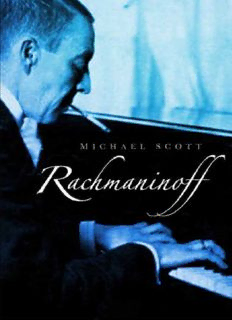Table Of ContentRachmaninoff
For Michael and Pamela Hartnall
Rachmaninoff
MICHAEL SCOTT
First published in 2011
The History Press
The Mill, Brimscombe Port
Stroud, Gloucestershire, GL5 2QG
www.thehistorypress.co.uk
This ebook edition first published in 2011
All rights reserved
© Michael Scott, 2008, 2011
The right of Michael Scott, to be identified as the Author of this work has been asserted in accordance with
the Copyrights, Designs and Patents Act 1988.
This ebook is copyright material and must not be copied, reproduced, transferred, distributed, leased,
licensed or publicly performed or used in any way except as specifically permitted in writing by the
publishers, as allowed under the terms and conditions under which it was purchased or as strictly permitted
by applicable copyright law. Any unauthorised distribution or use of this text may be a direct infringement
of the author’s and publisher’s rights, and those responsible may be liable in law accordingly.
EPUB ISBN 978 0 7524 7242 3
MOBI ISBN 978 0 7524 7241 6
Original typesetting by The History Press
Contents
Acknowledgements
Preface
1 1873–1885
2 1885–1889
3 1889–1893
4 1892–1897
5 1897–1902
6 1902–1906
7 1906–1909
8 1909–1911
9 1912–1914
10 1914–1917
11 1917–1920
12 1920–1924
13 1924–1927
14 1927–1930
15 1930–1932
16 1932–1936
17 1937–1939
18 1939–1943
Notes
Bibliography
Music, like poetry, is a passion and problem
Sergei Rachmaninoff
Acknowledgements
I should particularly like to thank many friends over the years who have
generously helped me in countless different ways: Michael Aspinall of Naples
who has given me the benefit of his erudition and knowledge; Gregor Benko of
New York who has been unstinting in his efforts to secure information; the late
Richard Bebb and his peerless collection of recordings and memorabilia; Jack
Buckley; Peter G. Davis of New York Magazine; Nicholas Hamer of Mauritius
for his unstinting generosity and exceptional patience; Michael and Pamela
Hartnall; Stephen Hastings, Editor of Musica; the late Jack Henderson who went
to Rachmaninoff recitals; the late Joel Honig; Francesco Izzo; the late Frank
Johnson, Editor of The Spectator; Vivian Liff; Bert Luccarelli; Guthrie Luke,
pupil of Alfred Cortot; Barrie Martyn, author of Rachmaninoff: Composer,
Pianist, Conductor, and his wife Alice, who graciously invited me to their home
before we had even met; Liz Measures; Andy Miller and Karen Christenfeld of
Rome; Joel Pritkin who sent me photographs of Rachmaninoff’s last Californian
residence; the late Patric Schmidt of Opera Rara; Randolph Mickelson who
entertained me at his homes in Venice and New York; Mary Tzambiras; John
Ransley; my brother John and sister-in-law Coby who invited me to Riga; my
sister Edith and brother-in-law Philip; Robert and Jill Slotover; Robert Tuggle,
Archivist of the Metropolitan Opera, New York; the late Professor L.J.Wathen
of Houston; Raymond A.White of the Library of Congress, Washington; and
last, but not least, to Robert Dudley. I am also grateful to Christopher Feeney,
Jim Crawley, Sophie Bradshaw and Kai Tabacek of The History Press.
I have transliterated Rachmaninoff the way he did himself, that is in the French
style, as I have done with Chaliapin, Diaghileff, Baklanoff and Tchaikovsky.
With other names I have preferred familiar spellings. Inevitably this has led to
inconsistencies, but then English is irregular and systems are inapplicable.
Preface
Rachmaninoff was the last in the tradition of the great Romantic composer
pianists that had developed through the nineteenth century, from the days of
Chopin and Liszt. By his time, the increasing complexity of music had led to a
growth in the size and importance of the orchestra which demanded another new
type of virtuoso: the conductor. Whereas before the revolution in Russia
Rachmaninoff was well known as a conductor, after it, exiled in the west, he
turned to the piano and to composing, and hardly ever conducted. Another, from
our point of view today, more revealing respect in which he differed from his
predecessors is that he lived into the age of recordings, and as well as his music
we now also have records of him as a pianist and conductor. They have
something interesting to tell us, not only about his own compositions, but they
are hardly less illuminating for the light they throw on the interpretation of
Romantic music generally.
By the First World War, even in a society as reactionary as imperial Russia,
his compositions reflected a musical style that had already become passé. His
records shed light not only on his own compositions, but on the interpretation of
Romantic music generally. There is a paradox contained in the fact that although
critics sniffed at his compositions, especially after he moved to America and
western Europe, the public continued to admire them inordinately. It is revealing
that notwithstanding the Depression, the concerted works he played were almost
always his own compositions.1
Today, more than sixty years have passed since his death and his music has
become a part of the concert repertory; his reputation as a composer has been
restored. In 1918 when he began his career as a piano virtuoso, aside from his
own compositions, his repertory was of the narrowest kind. He played only a
few token works from the Classical period (often arrangements or paraphrases)
and rarely played anything more modern than the works of Scriabin and
Medtner. Looking over his concert programmes today, much in them may seem
insubstantial or overfamiliar. We might feel tempted to accuse him of cynicism –
or of having his eye on the box-office. There was no need for him to adapt his
playing, as every pianist must today, to the many divergent musical styles that
are now available.
Description:The musical child of Russia's golden age, Sergei Rachmaninoff, was the last great romantic. Scorned by the musical establishment until very recently, his music received hostile reviews from critics and other composers. Conversely, it never failed to find widespread popular acclaim. Michael Scott's b

